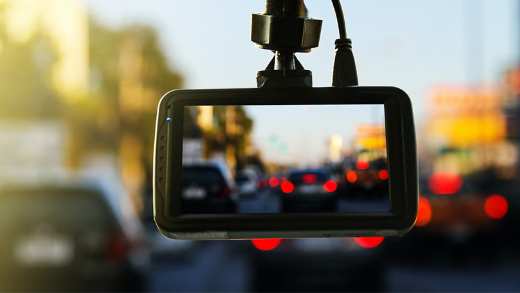Can a car dash cam help with insurance claims?
You’ve been in a car accident and it wasn’t your fault. But can you prove that?

When it comes to accidents on the road, who’s to blame isn’t always clear. And even if you know it wasn’t your fault, proving that can sometimes be difficult when it’s your word against someone else’s.
That’s just one of the reasons why dash cams are becoming more and more popular. They can provide a record of what happened in a car accident, which can help determine who was at fault and make the process smoother for everyone involved.
What is a dash cam?
A dash cam is a camera fixed to the dashboard or windscreen of a vehicle. It automatically turns on when you start your car and continuously records everything that takes place on the road ahead.
The footage is stored on an internal micro SD card. Standard dash cams usually operate by overwriting the oldest footage, once the card is full. The recorded footage is time-stamped in a tamperproof way, making it an excellent ‘witness’ to any road traffic incident. And it’s easy for you to share it if needed, for example with the police or your insurance company.
Depending on the type of dash cam you opt for, there are usually other extra features for you to choose from. For example, some models will protect your car even while it’s parked – turning on automatically if an impact is detected.
Do I need a front and rear dash cam?
If you’re thinking about picking a dash cam, you have two choices:
- A front dash cam – this will record everything that happens on the road in front of your car.
- Front and rear dash cam – this will record the view both in front and behind your car.
Having just a front dash cam is cheaper, but it won’t capture any incidents that happen behind your car, such as a car running into the back of you.
Are dash cams legal?
Dash cams are legal to use in the UK.
However, it’s essential that you make sure your dash cam is fitted correctly in a safe place in the car and does not obscure your view of the road.
Dash cams are now regularly used by police and the footage they capture can be used as evidence when taking drivers to court.
Advantages of a dash cam for car insurance claims
Dash cam footage is now accepted by a growing number of insurers – including us – as evidence in the event of a claim on your car insurance. When it comes to a dash cam’s effectiveness, it’s all about the quality of the footage. You’ll need clear footage if you want to use it as part of a claim, so it’s useful to make sure it’s clear enough to make out number plates and other important details.
Can I use dash cam footage to support my car insurance claim?
Dash cam footage can help prove who’s at fault in situations that would otherwise have no witnesses. This means it can be useful for building the case for your claim. The following case study shows how one of our customer’s dash cam helped with their claim.
Ben Footnote [1] was following a van along a quiet road when he decided to overtake it. His front facing dash cam then caught the moment the van driver swerved across the centre line and collided with the front of his car.
According to Aviva’s James Bolderston, without the dash cam footage Ben could easily have been forced to accept some of the blame. He explains:
“The most likely defence in this situation is: ‘he collided with me while overtaking’. And the damage [caused to Ben’s car] would match up with that scenario. In the absence of independent evidence, we could have been looking to settle as a 50/50.”.
However, Ben’s dash cam footage was able to clearly show that he had no liability.
James adds: “This is a good example of where a dash cam was able to secure us a 100% non-fault claim.”
Things to consider before fitting a dash cam
There are a few things to take into consideration if you decide to buy a dash cam.
- Invasion of privacy – Think carefully before uploading dash cam footage to the internet hoping to get likes. This is particularly important if there’s a chance the footage might be used in court as evidence, as you could jeopardise your case.
- Incorrectly placed – If the dash cam isn't fitted in a safe place, they could act as a distraction or cause a blind spot. If you’re in an accident caused by a misplaced dash cam you would be liable.
- Theft – As dash cams are normally fixed to the dashboard or windscreen, they’re in plain sight and can act as a lure for thieves.
How to claim with us using dash cam footage
When you make a claim on your car insurance, we will ask you if you have dash cam footage.
If the answer is yes, we will send you a link to a secure website where you can quickly and easily upload your footage.



